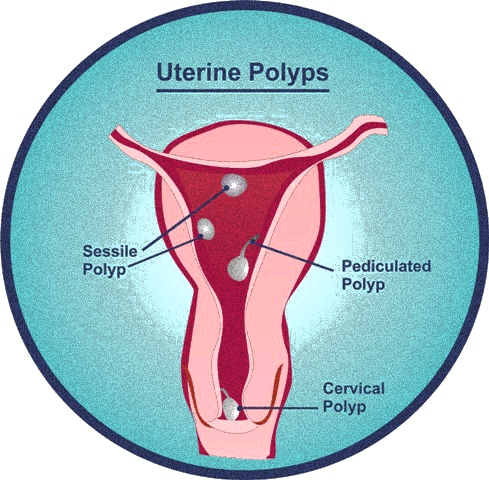The cervix, the bottom portion of the uterus that attaches to the vagina, is where cervical polyps grow. They typically don’t produce symptoms and are small and benign. However, they occasionally induce spotting between periods, irregular vaginal bleeding, or pain during sex. While surgical excision is frequently used to treat them, some natural remedies for cervical polyps can help ease symptoms and stop recurrence.
Top Natural Remedies for Cervical Polyps

Apple Cider Vinegar: Cervical polyps are among the many common health disorders for which apple cider vinegar is a well-liked natural treatment. Its acidity can aid in the polyp’s termination, and its antibacterial qualities can help prevent infection. Combine one tablespoon of warm water twice daily with apple cider vinegar. Alternatively, soak a cotton ball in diluted apple cider vinegar and place it on the polyp for a while, twice a day.
Green Tea: Antioxidants in green tea are potent in halting the development of aberrant cells. Cervical polyps can be prevented by drinking two to three cups of green tea daily. A green tea bag can also be applied directly into the vagina to reach the polyp on the cervix for several minutes twice daily after being soaked in hot water and let to cool.
Turmeric: Spices like turmeric can assist in lessening inflammation and stopping aberrant cell growth since they have anti-inflammatory and antioxidant effects. One glass of warm milk and one teaspoon of turmeric powder should be consumed daily. Alternatively, apply a paste of turmeric powder and water on the polyp twice daily for a few minutes.
Castor Oil: Natural anti-inflammatory castor oil can help reduce the size of cervical polyps. The polyp should be treated with a small amount of castor oil and covered with a fresh cotton cloth. Keep it on for several hours or overnight each day until the polyp is gone.
Diet and Lifestyle Changes: Altering your diet and way of life can also help stop cervical polyps from returning. An immune system boost and aberrant cell growth prevention can be achieved by eating a balanced diet of fruits, whole grains, lean proteins, and vegetables. Cervical polyps can also be avoided by abstaining from smoking, consuming less alcohol, and maintaining a healthy weight.

Garlic: Garlic has antibacterial and anti-inflammatory qualities that can help lessen infection risk and inflammation. Regularly using garlic or garlic supplements may help stop cervical polyp growth and recurrence.
Pineapple: Bromelain, an anti-inflammatory enzyme found in pineapples, is a source of inflammation. Consuming fresh pineapple or supplementing with bromelain may help lessen swelling and decrease cervical polyps.
Aloe Vera: Natural anti-inflammatory aloe vera can help reduce inflammation and halt the development of aberrant cells. Aloe vera gel applied directly to the polyp may help it shrink and relieve symptoms.
Ginger: Ginger’s anti-inflammatory qualities can help lessen inflammation and stop the development of aberrant cells. Consuming ginger tea or taking ginger pills may help reduce symptoms and prevent cervical polyps from returning.
Vitamins and Supplements: Cervical polyps may also be treated with several vitamins and supplements. The antioxidant qualities of vitamins C, E, and folic acid can prevent aberrant cell development. Supplemental zinc may also aid in infection prevention and boost the immune system.
Frankincense Essential Oil: Due to its anti-inflammatory and antibacterial characteristics, it can help lessen inflammation and shield the body from infection. Combine a few drops of frankincense essential oil with a carrier oil, such as coconut oil, and apply directly to the polyp for several minutes twice daily.
Black Cohosh: This herb is frequently used to treat menstruation irregularities and menopausal symptoms in women. Due to its anti-inflammatory characteristics, cervical polyps may contract, and inflammation may be lessened. Before consuming black cohosh, especially if you have a history of liver issues, speak with a healthcare professional.
Chasteberry: Chasteberry is a typical herbal remedy for menstruation and reproductive issues. Due to its anti-inflammatory characteristics, cervical polyps may contract, and inflammation may be lessened. Before using chasteberry, especially if you’re using hormonal drugs, speak to your doctor.

Dandelion Root: Natural diuretics like dandelion root can help remove toxins and lessen inflammation. Drinking dandelion root tea or taking dandelion root supplements may help reduce the size of cervical polyps and prevent their recurrence.
Probiotics: These are living yeasts and bacteria that benefit your immune and digestive systems. The immune system may be strengthened, and infections may be avoided with probiotic supplements, which may help stop cervical polyp growth and recurrence.
Yoga and Exercise: Yoga and physical activity can enhance circulation, strengthen the immune system, and lower stress, all of which help treat cervical polyps. Yoga or regular exercise may also help shrink cervical polyps and prevent their return.
Although natural remedies for cervical polyps can be effective, it’s essential to remember that this is not a replacement for professional medical care. Let’s say you believe you may have cervical polyps. In that case, the best action is to see a healthcare expert for a precise diagnosis.
DISCLAIMER: All content on this website is presented solely for educational and informational objectives. Do not rely on the information provided as a replacement for advice, diagnosis, or treatment from a qualified medical expert. If you are pregnant, nursing, or have any preexisting medical concerns, talk to your doctor before using any herbal or natural medicines.
References
- Journal of Alternative and Complementary Medicine: https://www.liebertpub.com/loi/acm
- Nutrition Journal: https://nutritionj.biomedcentral.com/articles/10.1186/1475-2891-12-129
